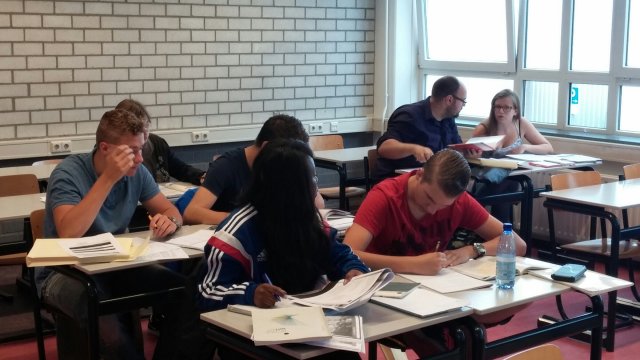Summer schools help to prevent children having to repeat a year
Going to school in the summer holidays helps to prevent children having to repeat a year. This conclusion was drawn by researchers Sytske Faber, Greetje Timmerman and Anne Kievitsbosch from the University of Groningen in their evaluation of the ‘Summer School’ experiment held in the summer of 2014.
Faber, Timmerman and Kievitsbosch carried out their research in 2014. A total of 320 pupils from 15 secondary schools attended the 2014 summer school, 276 of whom (86%) progressed to the next class. This is almost the same percentage as in 2013 (85%).
Lasting positive effect
The research showed that the positive effect was still being felt a year later: 75% of the pupils who progressed to the next class after attending the 2013 summer school once again progressed to the 2014-2015 school year or passed their leaving exams.

Test
Pupils attend summer school for two weeks. They work in small groups of a maximum of 6, under the supervision of a summer school teacher (from outside the school). The summer school finishes with a test in each subject. If they pass all their tests, they are allowed to progress to the next class.
Mainly senior general secondary school pupils
The summer school helps to prevent children from all year groups having to repeat a year, but is particularly effective for pupils in year 4 of senior general secondary education (HAVO). Almost fifty percent of all pupils taking part were senior general secondary school pupils, 71% of whom were in year 4. General secondary school pupils in year 4 are therefore over-represented at summer school. The core subjects are the most popular at summer school: maths (33%), Dutch (13%) and English (11%).
More boys than girls
The ratio of boys who progressed to the next class to girls is 61% to 39%. These percentages correspond with the ratio of boys to girls taking part. In terms of school type, 31% of those who progressed were in pre-vocational secondary education (VMBO), 48% in senior general secondary education (HAVO) and 21% in pre-university education (VWO/Gymnasium, 19% and 2% respectively).
Financial success
In addition to being an academic success, the summer school is also a financial success. Repeating a year is an expensive business, which comes at a cost of approximately € 7,400 per pupil. The summer school costs just € 650 per pupil, resulting in considerable savings. The 12 to 15 summer schools attended by the 250-300 pupils during the experiments in 2013 and 2014 saved more than € 1 million (per year).
More information
- Report - De zomerschool: een effectieve interventie tegen zittenblijven (S.E. Faber MSc.; Prof.dr. M.C. Timmerman; A.F. Kievitsbosch MSc.) (in Dutch)
- For more information, please contact Greetje Timmerman, phone 050-3636235, m.c.timmerman rug.nl
| Last modified: | 20 June 2024 07.47 a.m. |
More news
-
15 April 2025
Impact gaswinningsproblemen op Groningers: negatieve ontwikkeling zet niet door, maar meerdere keren schade blijft een punt van zorg
Impact gaswinningsproblemen op Groningers: negatieve ontwikkeling zet niet door, maar meerdere keren schade blijft een punt van zorg
-
17 March 2025
Liekuut | The high price of conflicts
According to Carsten de Dreu, Professor of Foundations of Cooperation and Social Organization at the University of Groningen, a lot can be learned from conflicts.
-
10 March 2025
Science for Society | Memory Lab for higher marks
Learning facts at school is something hardly anyone likes. The day before a test, pupils cram as many words or names as possible into their heads, only to hopefully remember them the next morning and then forget them again after the test.
